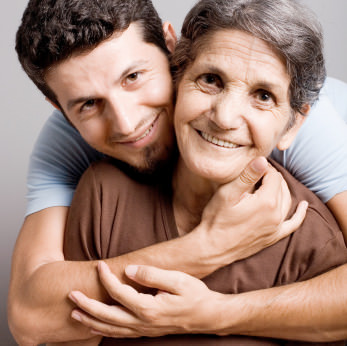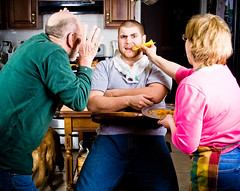
istockPhoto
A mother’s trait of simply “being there” was mentioned most frequently by young men as critical in how close they were to their moms — whether that meant talking about romance, discussing faith or picking a college major, according to a Baylor University researcher.
The new TV series Bates Motel (inspired by Alfred Hitchcock’s Psycho) is provoking talk about mothers and sons, it’s a good time to consider what makes for closeness (or not) in that parent-child bonding, says Mark T. Morman, Ph.D., a professor of communication studies in Baylor’s College of Arts and Sciences.
Conversation is crucial in bonding between mothers and sons, with the most prominent topic that of relationships, said Morman, whose study on the topic was published in the Journal of Family Communication in 2012.
That’s very different from father-daughter relationships, which tend to revolve around such shared activities as sports, he said.
Mothers also mentioned “social support” as vital to their connection with sons, Morman said.
“There are a variety of reasons to believe that mothers specifically influence their sons in a host of significant ways” — including on such issues as antisocial behavior, use of alcohol and suicidal thoughts, he said.
For the most part, mothers and sons in the study were in “remarkable agreement” about incidents they saw as critical — among them social support, family crisis, divorce, son maturing and son leaving for college or becoming physically distant for another reason, Morman said.
Here’s a look at incidents that are pivotal:
“BEING THERE”
One son wrote that when he got into a fight in high school, “this created a lot of tension between my dad and myself. My mother helped communicate between us, and she was understanding of my situation. I was able to confide in her, and we have been close ever since.”
Another said he grew close to his mother as she helped him lose a great deal of weight in elementary school.
For another son, “the biggest moment was probably struggling with my faith in high school and being able to communicate with my mom.”
Support during or after a breakup with a girlfriend was mentioned by several sons.
In one case, a son’s choice of girlfriend caused strain for the mother. “However, that relationship eventually ended, allowing him to meet and marry the wonderful young lady that is now an amazing part of our family,” the mother said.
HARD TIMES
Family crisis —such as illness, injury, death or problems with the authorities — emerged as the second largest category of responses among sons and mothers, with several men mentioning times when their mother’s health was at stake.
“My mother was diagnosed with a rare form of cancer two years ago,” one young man related. “I was a junior in high school, and I became distinctly aware that I could lose my mom forever.”
One mother recalled a time she yelled at her son and humiliated him because he did not seem to be trying during homeschooling. “He began to cry and said that he was stupid. At that point I knew that I was the stupid one . . . I realized that his spirit was more sensitive than I knew. It made me love him and be careful to affirm him much more after that.”
OUT OF THE NEST
Physical distance — such as when a son left for college — was the category that drew the third largest response for sons, with many reporting the miles actually brought them emotionally closer. “Something like, ‘you don’t know what you have until it’s gone,’” one son wrote.
A SON’S A SON TILL HE TAKES A WIFE
For mothers, meanwhile, a son’s marriage was the third most frequent pivotal time, with other changes in closeness occurring when a son matured, went to college or became a father. One woman said that her son’s marriage to “the perfect daughter-in-law” made it easy to stay close, but “in a different way.” Another woman said her “strained relationship” with her son changed when he joined the military — “mainly because the Army helped him to grow and mature as a young man.”
DISCORD
Conflict, whether in shouting matches or the silent treatment, sometimes drove mothers and sons apart, but it often had an upside as they worked through differences.
“I became close to my mother in high school when she caught me sneaking out of the house to go hang out with friends,” one son wrote. “At first, it distanced us. But as I came to realize her forgiveness, my relationship with her became closer.”
On a side note, conflict resolution sometimes takes an unusual twist — as in with the young man who invited his mother along on the senior trip. To find out more about that — and about romance as a talking point between moms and sons — view embedded videos with Morman at: http://www.baylor.edu/mediacommunications/news.php?action=story&story=129291
***STUDY METHODOLOGY
Study participants were 139 sons and 68 unrelated mothers, with the sons being at least age 18. Mothers were asked to write about a memorable time they shared with their sons, while sons were asked to relate one about their mothers.
Analysis of the sons’ responses produced a total of 130 different items, with most reporting only one critical incident. Mothers’ responses totaled 72 items. While many reported only one incident, others reported multiple events.


